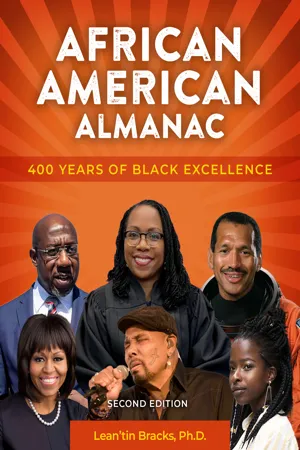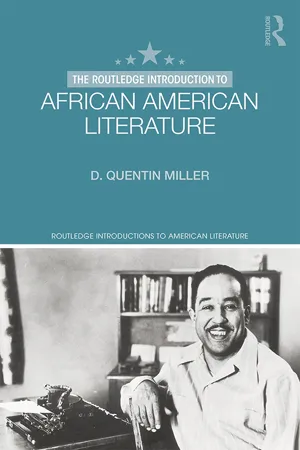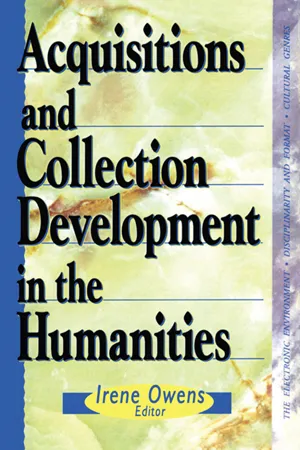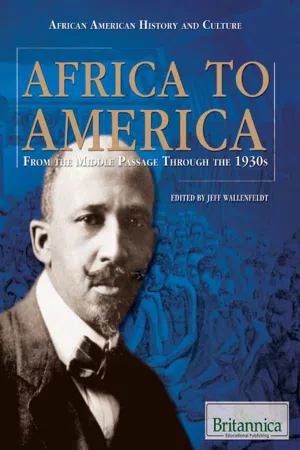Literature
African American Literature
African American Literature refers to the literary works produced by writers of African descent in the United States. It encompasses a wide range of genres, including poetry, fiction, drama, and non-fiction, and explores themes such as slavery, racism, identity, and the African American experience. African American Literature has played a significant role in shaping American culture and has contributed to the ongoing conversation about race and social justice.
Written by Perlego with AI-assistance
Related key terms
4 Key excerpts on "African American Literature"
- eBook - ePub
African American Almanac
400 Years of Black Excellence
- Lean'tin Bracks(Author)
- 2023(Publication Date)
- Visible Ink Press(Publisher)
African American authors have influenced contemporary audiences and earned numerous national and international awards. Pulitzer Prize winners include Rita Dove for poetry (1987), August Wilson for playwriting (1987 and 1990), and Alex Haley for his contribution to the literature of slavery (1976). The National Book Award winners since 1975 include (in fiction) Alice Walker (1983) and Charles Johnson (1990), and, in poetry, Lucille Clifton (2000).At the end of the 20th century and the beginning of the 21st century, African American writing has continued to explore identity, but the oppressive legacy of the past has become only one factor, with other issues such as gender, sexual orientation, and individual challenges also being paramount. Writers such as E. Lynn Harris, Omar Tyree, Connie Briso, and Zane have developed a wide following and were major booksellers in their area of contemporary Black popular fiction. These works are considered largely outside the realm of serious literature and more a function of popular culture and entertainment. With the success of many programs in African American studies, more writers are coming from academic settings.Works that have been adapted to films are generally more known by the general public than the literary works themselves, but they continue to create and increase audiences for both popular books and film. The influence of contemporary fiction in expanding reading audiences, both Black and white, has continued the interest of mainstream publishers in Black writers.Literature of the 21st century has taken the words of Toni Morrison to the page. Blackness is a default (a preselected option) — unapologetic, boundless, and topically and artistically free. Black Literature has evolved from a contrived absence to become symbols of artistic mastery. It is sophisticated and highly individualized. It offers a variety of voices, aesthetics, genres, literary troupes, and dynamic conversations full of romanticism and idealism. History and specifically slave narratives have served to intensify the meaning of freedom while retrieving or creating stories of heroes and healing. While functionality is still an important point of discussion for the Black writers from any generation, writers in the 21st - D. Quentin Miller(Author)
- 2016(Publication Date)
- Routledge(Publisher)
The prominence of the vernacular isn’t the only complicating factor in defining African American Literature. “Literature,” in addition to referring to written texts, generally connotes writing of some enduring social or cultural value. Literature is often associated with complexity, and its texts embody multiple meanings. The poet Ezra Pound defined it as “news that stays news;” in other words, its relevance endures over time. As a subject of study in academic settings, literature is often presented as a form of cultural production that is challenging to understand due to complex layering and obscure allusions. This line of thinking suggests that literature is something not everyone can appreciate: it requires of its readers a level of sophistication that comes with experience, education, and training.Yet within every tradition there are works of literature deemed “popular,” or works that might fit into certain genre categories (such as “crime,” “romance,” or “science fiction” within the broader category of fiction). Our discussion of “the vernacular” brings with it the question of what makes a work worthy of the name literature. Must literature be high art in the sense of being sophisticated, intellectual, and informed by a long tradition of other literary works? These questions pertain to all bodies of literature, but they are especially poignant in terms of nineteenth-century African American Literature because of the context of its production and the nature of its audience. Many early works of African American Literature had a specific rhetorical intent: to persuade the (white, educated) reader of the moral repugnancy of slavery and to expose readers to the physical, mental, and spiritual degradation suffered by slaves. These works are relatively straightforward, and their central intent can be gleaned by readers without much experience or training, as well as by more sophisticated readers. Yet one of the earliest works of African American Literature is Phillis Wheatley’s poetry collection, Poems on Various Subjects, Religious and Moral- Linda S Katz, Sally J Kenney, Helen Kinsella(Authors)
- 2013(Publication Date)
- Routledge(Publisher)
Black Art and Culture in the Twentieth Century (New York: Thames & Hudson, 1997), edited by Richard J. Powell, are additional guides to source information on blacks in all areas within the humanities.An unprecedented quantity of works on African American Literature has been produced over the years. These sources provide access to African American writers who, by and large, have focused their artistic output on the cause of black freedom. It was, according to J. Saunders Redding, a “literature of necessity,” concerned with the reality of America’s racial situation. Literature of anger and crisis is often a cry of revolt and continues a tradition established in the days of slavery, and can be traced back to folk sources–to the spirituals, work songs, tales, and legends of old. Some titles that provide background information on black writers include Living Black American Authors: A Biographical Directory (1974), which provides data on writers in a range of fields; Black American Writers, 1773-1949: A Bibliography and Union List (Boston: G.K. Hall, 1975), which chronicles, by subject, books by black authors, and indicates which of the participating Southeastern U.S. libraries owns each title; and Black American Writers Past and Present: A Biographical and Bibliographical Dictionary (Metuchen, NJ: Scarecrow, 1975), a comprehensive two-volume work providing personal and bibliographical data on novelists, poets, playwrights and literary critics. The Harlem Renaissance: An Annotated Bibliography and Commentary- eBook - ePub
Africa to America
From the Middle Passage Through the 1930s
- Britannica Educational Publishing, Jeff Wallenfeldt(Authors)
- 2010(Publication Date)
- Britannica Educational Publishing(Publisher)
ITERATURE AND THE ARTSAfrican American Literature TO THE 1940S
S ince the pre-Revolutionary War period, African American writers have engaged in a creative if often contentious dialogue with American letters. The result is a literature rich in expressive subtlety and social insight, offering illuminating assessments of American identities and history. This literature has been recognized nationally as well as internationally since its inception in the late 18th century.SLAVE NARRATIVESIn the wake of the bloody Nat Turner rebellion in Southampton county, Virginia, in 1831, an increasingly fervent antislavery movement in the United States sponsored firsthand autobiographical accounts of slavery by fugitives from the South in order to make abolitionists of a largely indifferent white Northern readership. From 1830 to the end of the slavery era, the fugitive slave narrative dominated the literary landscape of antebellum black America. The Narrative of the Life of Frederick Douglass, an American Slave, Written by Himself (1845) gained the most attention, establishing Frederick Douglass as the leading African American man of letters of his time. By predicating his struggle for freedom on his solitary pursuit of literacy, education, and independence, Douglass portrayed himself as a self-made man, which appealed strongly to middle-class white Americans. In his second, revised autobiography, My Bondage and My Freedom (1855), Douglass depicted himself as a product of a slave community in Maryland’s Eastern Shore and explained how his struggles for independence and liberty did not end when he reached the so-called “free states” of the North. Harriet Jacobs’s Incidents in the Life of a Slave Girl
Index pages curate the most relevant extracts from our library of academic textbooks. They’ve been created using an in-house natural language model (NLM), each adding context and meaning to key research topics.



